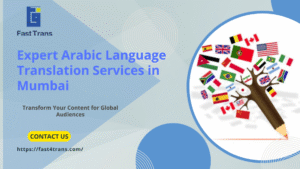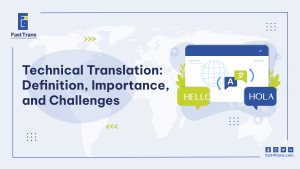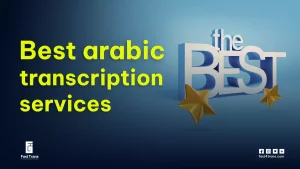In recent years, gaming has become a global marketplace with audiences from all over the world. This massive growth in the number of gamers came mainly as a result of the COVID-19 pandemic when people had different forms of communication. As a result of the pandemic, around 84% of the gaming companies said that they had experienced their IT infrastructure during the first three months of the pandemic, according to a survey by Gcore. This growth is a benefit for game developers since it allows them to reach more players than ever.
However, with this growth in the gaming industry comes a new challenge for the developers, and this is localization.
Arabic gaming localization challenges like adapting slang, navigating cultural sensitivities, and adjusting the right-to-left script. Regional slang varies, meaning terms can have different meanings or even be offensive across countries, while Arabic’s longer words can disrupt game interface designs. Additionally, balancing the original tone and style of a game with local cultural values, such as humor or character names, is crucial. To overcome these hurdles, strategies like concise language, AI-assisted translation, and transcreation ensure games remain engaging and culturally relevant, all while staying true to the original experience.
What are Arabic gaming localization challenges?
Arabic game localization faces challenges such as slang differences, cultural sensitivities, and formatting issues, which impact text expansion, UI design, and voiceover syncing. Adjusting content to fit regional values, including gender representation and humor, is crucial for a successful adaptation.
1. Slang
Slang is one of the most common challenges when localizing a game to Arabic. Each region in the Arab world has its own distinct slang, and some terms might be understood differently across countries. What might be an acceptable term in one country could be offensive or carry a negative connotation in another.
Furthermore, slang terms often evolve rapidly, and what was popular at the time of the game’s release might become outdated or take on an entirely different meaning over time. Additionally, certain slang expressions may not have direct equivalents in Arabic, and cultural sensitivities related to politics, religion, or social norms need to be carefully considered to avoid offending players.
For example, terms related to politics, religion, or social taboos may be considered offensive in some Arabic-speaking countries but not in others, requiring careful handling.
2. Formatting Issues
Arabic language localization often presents unique challenges due to its structure and grammar. One of the most significant issues is text expansion—Arabic words tend to be longer than their English counterparts, which can cause problems with fitting text into pre-existing UI elements.
This means that designers may need to rework the game’s interface, such as adjusting menus, buttons, and text boxes to accommodate the longer Arabic text.
Moreover, Arabic is a right-to-left (RTL) language, so the entire user interface might need to be flipped to ensure readability and a natural user experience. This involves modifying layouts, text direction, and even visual elements to align with Arabic reading habits. Translators also need to focus on meaning and context rather than direct word-for-word translations to maintain the game’s flow and fit.
3. Maintaining Tone and style
Maintaining the tone and style of the original game while localizing it for an Arabic audience can be a challenging task. Arabic games often appeal to different cultural tastes, so localization should ensure that the original tone of humor, drama, or action is preserved while also making it culturally relevant.
The humor, references, and dialogue must be adapted to align with the values and preferences of Arabic-speaking players, which may differ greatly from those of Western audiences. For instance, Arabic games often lean toward family-friendly or conservative tones due to cultural preferences, so jokes or mature themes that are acceptable in other markets may need to be reworked.
Similarly, character names, dialogue, and even colors in the game might need to be altered to avoid cultural misunderstandings or to make the game more relatable to Arabic players. A major challenge is striking the right balance between staying true to the game’s essence and adapting it to be culturally appropriate and engaging for an Arabic audience.
4. Cultural Sensitivities and Content Restrictions
In many Arab countries, content related to politics, religion, or explicit material is heavily regulated and may be subject to censorship. Games that feature violence, alcohol, gambling, or controversial themes may need significant adjustments or even removal of content to comply with local laws and societal norms. For example, characters engaging in behaviors like smoking or drinking alcohol could be viewed as inappropriate, especially for younger audiences, and may need to be modified or omitted entirely.
Given the prominence of Islam in Arabic-speaking countries, references to religion, such as the depiction of religious figures or the use of religious symbols, must be handled carefully to avoid offending players. Additionally, some religious holidays, like Ramadan, might need to be taken into account for in-game events or timing of releases.
5. Date and Time Format
The Arab world predominantly uses the Hijri (Islamic) calendar in addition to the Gregorian calendar, which could cause issues with in-game events or time-based mechanics. For example, certain in-game events or rewards may need to align with Islamic holidays or Ramadan, requiring adjustments to the game’s time-keeping system or event scheduling. Ensuring that the game reflects local conventions for time and dates, such as the Arabic numbering system (١, ٢, ٣…) and date formats (Day/Month/Year), will create a more native experience.
6. Voiceover and Lip Syncing
If your game includes voiceovers, translating and recording dialogues in Arabic can be challenging because Arabic voiceovers are often longer than their English counterparts, which may cause issues with lip-syncing in cutscenes. This can result in a mismatch between the audio and character movements, which can negatively impact the player’s immersion. A solution may involve either adjusting the animation or shortening dialogue, which can affect the narrative’s richness.
Arabic gamers are accustomed to high-quality voice acting, especially for large, narrative-driven games. Finding experienced Arabic voice actors who can deliver the intended tone, emotion, and characterization can be difficult but is crucial for the overall success of the localization.
7. Handling Gender Representation
In many Arab cultures, gender roles are more conservative, and certain game content may need to be adjusted to better reflect local sensitivities. For example, sexualized imagery or exaggerated character designs, particularly for female characters, may not be acceptable in certain regions. Additionally, the portrayal of relationships, especially those outside of marriage, may require reworking to ensure cultural appropriateness.
Moreover, some Arabic-speaking countries are sensitive to strong female empowerment themes, so localizing female characters may involve changes to how they are presented or their roles within the narrative to better align with regional values.
8. Translating Humor and Idioms
Humor, especially idiomatic expressions, can be one of the most difficult things to translate effectively. Slang, sarcasm, wordplay, or puns that are commonplace in English-speaking cultures might not exist in the Arabic language or could be interpreted very differently. When localizing jokes or humorous content, it’s important to have a deep understanding of both the source and target cultures. For example, certain jokes may need to be replaced with something culturally relevant in the Arab world, ensuring that the humor resonates with local players.
9. Adapting Game Mechanics and Gameplay
The approach to in-game purchases, microtransactions, and advertising might need adjustments when localizing a game for the Arabic market. In some Arabic-speaking countries, players may prefer certain payment methods (like mobile wallets or regional credit cards) over global services like PayPal. Additionally, mobile gaming is hugely popular in the Arab world, so optimizing games for mobile platforms is essential.
Certain games might need to be adjusted to better cater to the gaming habits of Arabic players. This could involve adjusting the difficulty settings based on local preferences. In some cases, Arabic players may prefer a more casual gaming experience, while in others, the game might need to offer more complex mechanics or challenge levels to meet local expectations.
10. Localization of Marketing and Distribution
In the Arabic-speaking world, certain platforms or stores may be more dominant, so localization efforts should consider which distribution channels are most relevant for the region. For instance, the game may need to be made available on region-specific platforms or stores, such as local app stores or gaming platforms.
Additionally, marketing campaigns should be tailored to Arabic-speaking audiences by using culturally relevant advertising, social media campaigns, and partnerships with Arabic influencers. Using visuals, language, and themes that resonate with local players can help improve the overall appeal of the game.
11. Localizing UI and Icons
In addition to the text being right-to-left (RTL), the visual elements of the UI (such as icons, arrows, and menus) may need to be reversed or redesigned to make the game feel intuitive for Arabic-speaking players. For example, icons that typically point left (in English) may need to be flipped to point right to match the directionality of Arabic reading.
Even something as simple as the order of in-game menus or button prompts could need adjustment—often, buttons and actions are positioned differently based on reading direction.
How can gaming companies overcome the odds and go global?
To expand globally, gaming companies should focus on simplifying content for ease of translation, utilizing AI-driven tools for efficiency, and engaging local audiences through culturally relevant transcreation. These strategies ensure broad appeal and seamless localization.
1. Brevity
Brevity simply means to use concise and direct language. In localization, it is highly important to keep it as simple as possible. Keep in mind that you need to shorten the content’s size, to keep it understandable. Complicated text may be hard to translate and fit in a text box, which may affect the user’s experience and make them lose interest.
If the language used is too complicated, gamers will find it hard to follow up with what is happening in the game, rendering it difficult to digest. Using short linguistic utterances will definitely help the users understand the events and stay motivated to keep going.
You’re creating an entertainment product, after all, not a course curriculum!
2. Automation
Using Artificial Intelligence (AI) and Computer-assisted translation (CAT) tools will definitely help in Arabic localizing your game.
These tools can simplify the process since they mainly rely on translation memory technology. This technology allows them to memorize the terms used in previous projects to describe a certain situation. When localizing a similar situation, the TM will recall the previously used term, to help the translator instead of starting the translation from scratch.
3. Transcreation
Transcreation is a linguistic process that works on adapting a text from one language to another while maintaining its tone, intent, and style. In gaming, it is very challenging to find the exact direct translation for specific words. For instance, this can be seen when it comes to characters’ names. If a character has a name in English that has the connotation of strength or power, you can try to find the same meaning in Arabic, either in its folklore or its modern-day culture.
In this case, the localizer not only delivers the same intended meaning but also forms a cultural bond with the target audience that helps keep them more engaged.
Be a gamer yourself 🙂
One last important thing you can do to overcome the obstacle of localization in video games is to simply be a gamer yourself.
By becoming a gamer, you will make sure you understand your audience. You will be able to relate to their frustration when the meaning is not delivered, and you will relate to their struggles. This way you can help make your game more immersive and engaging when it is developed and localized by gamers.
Putting yourself in your customer’s shoes can never go wrong.
Did you know that Games are considered a SaaS product? What does SaaS mean?, find your answer in this Ultimate SaaS Localization Guide
Conclusion
Arabic gaming localization challenges, primarily due to linguistic and cultural differences. One major obstacle is the variability of slang across Arabic-speaking regions. Words or phrases that are acceptable in one country might be offensive in another, requiring careful navigation to avoid negative connotations. Additionally, Arabic’s right-to-left reading structure and the longer word lengths in comparison to English can pose significant issues in adapting game interfaces, necessitating layout and design adjustments to ensure a seamless user experience.
Moreover, maintaining the original tone and style of a game while making it culturally relevant to Arabic players is another hurdle. Humor, character names, and themes may need to be altered to better align with regional values, often requiring substantial changes to ensure that the game feels authentic and engaging to the target audience. To address these challenges, gaming companies can adopt strategies like using concise language, employing AI tools for translation, and focusing on transcreation to adapt content meaningfully while preserving its original intent.










